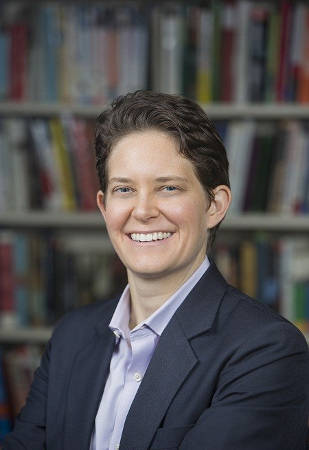[By John Hain under Creative Commons]
By Bennett Voyles
In 2000, Dorie Clark was a young reporter for The Boston Phoenix. Then, in 2001, she suddenly became a young unemployed reporter, a casualty of the general collapse of the US newspaper industry. Over the next 15 years, Clark has had to reinvent herself again and again, as a political campaign professional, lobbyist, professor and freelance writer, a range of experiences that eventually led her to write two popular books about personal branding, and build a business as a marketing consultant.

[Dorie Clark, author of ‘Reinventing You: Define Your Brand, Imagine Your Future’]
In Reinventing You: Define Your Brand, Imagine Your Future, the New York City-based writer and consultant described a process for reinventing yourself to fit in with a changing market. In her more recent book, Stand Out: How to Find Your Breakthrough Idea and Build a Following Around It, Clark offered a step-by-step approach for individuals who want to build a public reputation. We caught up with her recently. Edited excerpts from the interview:
Q. What tends to be the biggest challenge people run into when they’re trying to stand out at work?
A. I think one of the biggest barriers is that as individuals we often have a difficult time having a sense of what is actually unique about ourselves. We are our own baseline, and as a result, everything about us seems very normal. We can only gain that perspective about where we actually do excel and what is special about us by reaching out to other people and getting their feedback. Most people have a decent sense of how they are in general. If someone is quiet, they probably understand that they’re quiet, for instance, but the part that people miss is what about them is most noticeable or distinctive to other people? And there’s no way of knowing that without asking.
Q. One exercise you suggest is asking people to describe you in three words. How does that work?
A. I gave a talk once to a group of entrepreneurs, and they were so captivated by this idea of trying to gain this perspective that they wanted to do an exercise in real time, so they sent out one of their members into the hallway, and everybody wrote down three words to describe him. When he came back into the room, everybody read their three words. Out of the 10 people in the room, seven of them had included ‘creative’ as one of the top words to describe him. I’m sure that if you had asked him, “Are you a creative person?”, he would have said, “Yeah, sure”, but I think it would have been almost impossible for him to understand that that was the trait that was most memorable about him to other people.
Q. Are there other good ways to gain that kind of insight?
A. That’s the CliffsNotes version, to ask about a half a dozen people to describe you in only three words, but there are more intensive variations. One that is available to a lot of people in the corporate world, which I encourage them to take advantage of, is to have 360 degree interviews done. This is something that a lot of HR departments will pay for and is enormously valuable in understanding who you are and how you’re coming across to other people.
One more variation that you can do yourself, which I describe in my book Reinventing You, is to actually do a focus group about yourself. Not everybody is comfortable with the idea, but some people really love it. You recruit a friend to be your focus group moderator and you invite about half a dozen other friends to your house or their house. Over the course of an evening, you sit in the corner—you’re not allowed to speak except to ask clarifying questions, and you just take in the scene—while your friend runs a focus group talking about you, asking questions like, “what is Dorie’s greatest strength?” or “what do you wish Dorie did more of?” If you didn’t know what job Dorie had, what would you guess? That can yield a lot of surprising insights.
Q. Who should you ask?
A. Typically, what you want to do to make it most effective is to invite people who know you from different facets of your life. Invite your co-worker who’s also a pretty good friend, your childhood friend, your sister, the person from your book club—a group of people who have seen a lot of facets of you.
Q. What should you listen for?
A. Keep in mind, you are almost certainly only going to get positive feedback from people. If you’re asking, “Oh, describe me in three words”, they’re not going to say well, you’re kind of arrogant and…. They’re not going to do that. I don’t think they’re going to lie, but they will tell you the positive traits that they see.
What you need to do, as a responsible professional who wants to get the best data, is to accept the positive and say, “Okay, that’s great, that probably is a good reflection of my positive qualities”, but it is also true that your negative traits are very likely a mirror image of your positive traits. You need to ask the question, “Is it possible—it may not be—but is it possible that I sometimes carry the positive traits too far? Has it tipped over into being a weakness?” It is an amazing thing, for instance, to be a visionary leader. If everybody tells you you’re visionary, that’s fantastic, but the flipside of that, if you’re so visionary, it may mean that you’re not focused enough on the tactics or the details. Maybe you let things slide, maybe you’re always jumping to the next big idea. You need to interrogate yourself and ask, “Could that possibly be true?”
Q. One of the best lines in Reinventing You is a Hungarian proverb you quote, “If three people call you a horse, buy a saddle.” Do you have an example of the kind of decision you might make if you keep hearing something over and over again?
A. It’s really important to be aware of what other people are seeing and to recognise that we all have blind spots, and it’s possible that if we listen, we might be able to learn something from the feedback that we’re getting. I might think that I’m a really patient, wonderful manager but if I have heard from multiple sources that my employees are unhappy and they’re grumbling about me, maybe that’s something I should look into, maybe this conception I have of myself as being the best boss in the world isn’t quite accurate.
As a positive example, you might think that you’re a really good behind-the-scenes person: “Oh yeah, I’m an amazing number two, but I don’t want to be in the spotlight, that’s not me, that’s not my personality”, but the perspective from other people might actually be able to help you. I was on a Skype call with an Irish friend who is culturally a little less comfortable with self-promotion than Americans are, and she has always thought of herself as a behind-the-scenes person. I had said to her last week, “Liz, you’re so talented, you ought to be in the press more. You could write articles.” She said that in the past week, three different people had told her that. She thought that it might be a sign from the universe that even though it wasn’t something she was seeking or comfortable with, maybe it was a path that she ought to look into more.
Q. A lot of people are resistant to self-promotion, but you argue that it’s a mistake not to build a public reputation for yourself. In your second book, Stand Out, you describe building a strong profile as almost a kind of insurance. Why is that?
A. Obviously we’re entering an era economically where industries and companies are increasingly at risk for disruption. Job security is much less prevalent than it was in the past. I actually started my career as a journalist and got laid off from my job about a year into it, and had to reconfigure my life and make new plans, which was one of the things that prompted me to write the book Reinventing You. As a result, I have become acutely aware of how people can protect themselves and hedge against that kind of uncertainty. What my research has shown is that one of the very best things that you can do in order to safeguard your professional life is to develop a strong reputation. If people have heard of you, if they have a pre-existing positive conception of you and you lose your job, you will very quickly and easily be able to find another one because there’s already going to be a group of people that says, “Oh, I love her work, yes, that would be wonderful to have her on our team.” Whereas, if you are anonymous, outside your company, it becomes a lot harder to persuade people to take a chance on you.
Q. But what if your whole industry has been disrupted?
A. When it comes to reinventing yourself, one of the most important things you can do is to do what I call taking control of your narrative because other people may have a story about you—“Oh, he was such a great newspaper reporter, too bad I don’t have any newspaper jobs for him”— and then that’s the end of the story. Instead, you need to claim that narrative. If people have heard of you and they have a generalised positive impression you can shift the story to say, “No, no, it’s not that I’m a great newspaper reporter, it’s that I’m a great writer, and so I could write for your nonprofit or I could do corporate communications for your tech company” and those are very transferable skills, even if being a newspaper reporter per se is not.
Also Read
Part 1: The way to win market competition now
Part 2: How to create your product differentiation strategy
Part 3: Building a brand identity to create a high-value company
Part 4: Build your career and build your personal brand
[This article has been reproduced with permission from CKGSB Knowledge, the online research journal of the Cheung Kong Graduate School of Business (CKGSB), China's leading independent business school. For more articles on China business strategy, please visit CKGSB Knowledge.]



